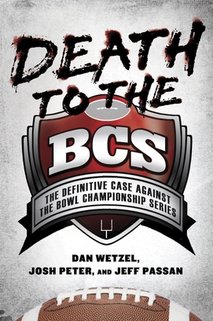
18 Oct 2010 13:25:00
The authors, who are reporters for Yahoo!, examined public records and interviewed officials representing universities, conferences andbowl games. They say they found a corrupt system that's inherently unfair to smaller programs, robs fans of seeing fair competition and often leaves taxpayers in the lurch. (At least one member of Congress has asked for a Justice Department investigation into whether the BCS violates antitrust laws.)
The BCS is technically run by the commissioners of college football's 11 conferences and the athletic director of Notre Dame, but the authors say it is controlled by the heads of the six largest conferences (Big Ten, Big East, ACC, SEC, Big 12 and Pac-10) and a handful of bowl directors. It's that elite group, they contend, that wields the power and divvies up revenue (from TV contracts, ticket sales and sponsorships), while using the system to keep smaller, non-BCS schools like Utah and Boise State out of the championshipgame.
Since the BCS began in 1998, 10 undefeated non-BCS conference teams have been shut out of the championship game, often passed over for BCS schools with a loss. That has caused public derision of the BCS, which the authors call "a roach amid a typhoon of Raid."
The book says bowl payouts aren't what they appear to be, with schools contractually obligated to buy a slew of game tickets, and the five BCS bowls often help cover financial losses that many schools incur playing in the other 30 or so bowl games.
"Death to the BCS" also says the executive director of the 2008 Kraft Fight Hunger Bowl was paid $320,492 in salary, more than 10 percent of the game's total revenue, and the University of Iowa had to buy each member of its marching band — which performed at halftime — a $65 game ticket for the 2009 Outback Bowl at a cost of $22,490. (The taxpayer-backed school took a $150,000 loss on the tickets.)
The authors offer a compelling alternative plan, one they say could generate three to four times the revenue: a 16-team playoff with the winners of the 11 Division I-A conferences and five at-large bids. They came up with the plan by consulting with conference commissioners, marketing professionals, athletic directors, TV executives and bowl representatives, among others.
They acknowledge a postseason playoff would be a bold step, one that likely won't happen without intervention by the Justice Department.
The authors, who are reporters for Yahoo!, examined public records and interviewed officials representing universities, conferences andbowl games. They say they found a corrupt system that's inherently unfair to smaller programs, robs fans of seeing fair competition and often leaves taxpayers in the lurch. (At least one member of Congress has asked for a Justice Department investigation into whether the BCS violates antitrust laws.)
The BCS is technically run by the commissioners of college football's 11 conferences and the athletic director of Notre Dame, but the authors say it is controlled by the heads of the six largest conferences (Big Ten, Big East, ACC, SEC, Big 12 and Pac-10) and a handful of bowl directors. It's that elite group, they contend, that wields the power and divvies up revenue (from TV contracts, ticket sales and sponsorships), while using the system to keep smaller, non-BCS schools like Utah and Boise State out of the championshipgame.
Since the BCS began in 1998, 10 undefeated non-BCS conference teams have been shut out of the championship game, often passed over for BCS schools with a loss. That has caused public derision of the BCS, which the authors call "a roach amid a typhoon of Raid."
The book says bowl payouts aren't what they appear to be, with schools contractually obligated to buy a slew of game tickets, and the five BCS bowls often help cover financial losses that many schools incur playing in the other 30 or so bowl games.
"Death to the BCS" also says the executive director of the 2008 Kraft Fight Hunger Bowl was paid $320,492 in salary, more than 10 percent of the game's total revenue, and the University of Iowa had to buy each member of its marching band — which performed at halftime — a $65 game ticket for the 2009 Outback Bowl at a cost of $22,490. (The taxpayer-backed school took a $150,000 loss on the tickets.)
The authors offer a compelling alternative plan, one they say could generate three to four times the revenue: a 16-team playoff with the winners of the 11 Division I-A conferences and five at-large bids. They came up with the plan by consulting with conference commissioners, marketing professionals, athletic directors, TV executives and bowl representatives, among others.
They acknowledge a postseason playoff would be a bold step, one that likely won't happen without intervention by the Justice Department.

